2022-2023 学年江苏省苏州市高三上学期期中英语试题及答
案
注意事项:
1.本试卷满分 150 分。考试时间 120 分钟。
2.答题前,务必将自己的学校,姓名、考试号等相关信息写在答题卡上规定的地方。
3.回答选择题时,选出每小题答案后,用铅笔把答题卡上对应题目的答案标号涂黑。如需改
动,用橡皮擦干净后,再选涂其他答案标号。回答非选择题时,将答案写在答题卡上,写在本
试卷上无效。
第一部分听力(共两节,满分 30 分)
做题时,先将答案标在试卷上。录音内容结束后,你将有两分钟的时间将试卷上的答案转涂
到答题卡上。
第一节(共 5 小题;每小题 1.5 分,满分 7.5 分)
听下面 5 段对话。每段对话后有一个小题,从题中所给的 A,B,C 三个选项中选出最佳选项。
听完每段对话后,你都有 10 秒钟的时间来回答有关小题和阅读下一小题。每段对话仅读一
遍。
1. What will the man do next?
A. Take an exercise class.
B. Have a shower.
C. Swim in a pool.
2.How does the man suggest the woman get to the airport?
A. By subway.
B. By bus.
C. By car.
3.Why does the man want to study abroad?
A. To learn English quicker.
B. To gain valuable experience.
C. To study at a good university.
4.What is the man doing?
A. Receiving a health checkup.
�
B. Interviewing a candidate.
C. Applying for a job.
5.What are the speakers mainly talking about?
A. A winter sport.
B. A hiking trip.
C. Weather conditions.
第二节(共 15 小题;每小题 1.5 分,满分 22.5 分)
听下面 5 段对话或独白。每段对话或独白后有几个小题,从题中所给的 A、B、C 三个选项
中选出最佳选项。听每段对话或独白前,你将有时间阅读各个小题,每小题 5 秒钟;听完后
各小题将给出 5 秒钟的作答时间。每段对话或独白读两遍。
听第 6 段材料,回答 6、7 题。
6.Why does the man leave his current position?
A. He is going to retire.
B. He has got a job elsewhere.
C. He will move to another city with his wife.
7.How does the woman feel now?
A. Lonely.
B. Unhappy.
C. Excited.
听第 7 段材料,回答第 8、9 题。
8.How did the man learn about the origin of badminton?
A. From his grandmother.
B. From a school lesson.
C. From a journey.
9. Why are the speakers waiting to play?
A. The court is occupied.
B. They arrived at the court late.
C. They didn’t book a court in advance.
听第 8 段材料,回答第 10 至 12 题。
�
10. Where does the conversation take place?
A. In a cinema.
B. In a school.
C. In the speakers’ house.
11.Who was the woman supposed to meet today?
A. Her doctor.
B. Her teacher.
C. Her friends.
12.Which movie series will the speakers watch?
A. Harry Potter.
B. Fast and Furious.
C. Mission Impossible.
听第 9 段材料,回答第 13 至 16 题。
13. What is the probable relationship between the speakers?
A. Shop owner and customer.
B. Tour guide and tourist.
C. Hotel worker and guest.
14. Which country does the woman come from?
A. China.
B. America.
C. South Africa.
15. What does the man say about smartphones in China?
A. They’re popular among businessmen.
B. They’re leading in advanced technology.
C. They’re cheaper than those of other countries.
16. What will the woman probably do next?
A. Get some cash.
B. Call her co-worker.
C. Open a credit card account.
听第 10 段材料,回答第 17 至 20 题。
�
17.What do we know about Jose?
A. He just finished high school.
B. He is going to start a new family.
C. He has graduated from university recently.
18.When will the party be held?
A. This Friday.
B. This Saturday.
C. This Sunday.
19.What does the speaker ask Jose to do?
A. Be responsible for his decisions.
B. Start a successful business.
C. Study overseas.
20. What does the speaker do?
A. He is a builder.
B. He is a cook.
C. He is a farmer.
第二部分阅读理解(共两节,满分 50 分)
第一节(共 15 小题;每小题 2.5 分,满分 37.5 分)
阅读下列短文,从每题所给的 A、B、C 和 D 四个选项中,选出最佳选项。
A
Most of us have an unreasonable fear or habit. Famous folks often seem to go
one step further.
Diane von Furstenberg
Fashion designer and icon Diane von Furstenberg (1946 - ) tapes a gold 20 -franc
coin in her shoe for good luck before every runway show. Her father hid the coin
in his shoe during World War II and gave it to her when she was a girl.
Lucille Ball
On the day that three-year-old Lucille Ball’s father died, a bird flew into
her home and became trapped. Traumatized(受精神创伤)by the events, she developed
a lifelong feeling of intense dislike of birds. The actor (1911 - 1989) even refused
�
to stay in hotels that had pictures of birds on the walls.
Charles Dickens
Author Charles Dickens (1812 - 1870) carried a navigational compass with him
at all times and always faced north when he slept. He believed it improved his
creativity and writing.
Gustav Mahler
Composer Gustav Mahler (1860 - 1911) thought he could cheat death by not naming
his ninth symphony by number. This was because several composers, including
Beethoven and Schubert, had died after completing their ninth symphonies. So Mahler
called his ninth The Song of the Earth—and it worked, in a sense. He lived long
enough to write most of his tenth symphony, though he died before it was performed.
1. Who is a perfect match for “TREASURE FROM DAD”?
A. Diane von Furstenberg.
B. Lucille Ball.
C. Charles Dickens.
D. Gustav Mahler.
2. Which of the following pictures best describes what Gustav Mahler believed in?
A.
C.
B.
D.
3. What do the above famous folks have in common?
A. They are more unreasonable than ordinary people.
B. They are influenced by their unusual beliefs.
C. They have recipes for good luck.
D. They have special fears.
�
【答案】1. A
2. C
3. B
【解析】
【导语】本文是一篇应用文。文章介绍了四位名人不同寻常的恐惧和习惯。
【1 题详解】
细节理解题。根据对 Diane von Furstenberg 介绍的句子“Her father hid the coin in his
shoe during World War II and gave it to her when she was a girl.(第二次世界大战
期间,她的父亲把这枚硬币藏在鞋子里,在她还是个小女孩的时候送给了她)”可知,TREASURE
FROM DAD 符合对 Diane von Furstenberg 描述。故选 A 项。
【2 题详解】
推理判断题。根据对 Gustav Mahler 介绍的句子“Composer Gustav Mahler (1860 - 1911)
thought he could cheat death by not naming his ninth symphony by number. This was
because several composers, including Beethoven and Schubert, had died after
completing their ninth symphonies. So Mahler called his ninth The Song of the Earth
(作曲家古斯塔夫·马勒(1860 - 1911)认为他可以通过不以数字命名第九交响曲来逃避死
亡。 这是因为包括贝多芬和舒伯特在内的几位作曲家都在完成第九交响曲后去世。 因此马
勒把他的第九部作品命名为《大地之歌》 )”可知,Gustav Mahler 是害怕“9”这个数字
的,而 C 项中的图片正好展示的是对数字“9”的恐惧。故选 C 项。
【3 题详解】
推理判断题。根据文章第一段“Most of us have an unreasonable fear or habit. Famous
folks often seem to go one step further.(我们大多数人都有一种不合理的恐惧或习惯。
名人似乎更是如此)”的内容,再分析文中提到的四位名人产生某种恐惧或习惯原因可知,
他们都受到不同寻常的信念的影响。故选 B 项。
B
Jim Metzner has spent nearly five decades documenting and sharing the sounds
of the world, from immersive portraits of American cities to unforgettable moments
with people and wildlife in varied places.
Now more people will be able to hear more of the world through Metzner’s tape.
The Library of Congress announced earlier this month that it has acquired the full
body of his life’s work. The recordings include soundscapes of every description
from around the world and interviews with scientists, artists and local people.
�
Whereas many recordists focus entirely on a single subject—nature, music or science
—Metzner’s recordings convey various human experiences accompanied by the vast
range of sounds from the natural world.
Metzner’s career began with a moment of realization in the 1970s, when he first
ventured onto the campus of UMass Amherst equipped with a stereo recorder, microphone
and ear phones. Metznerre called pushing the red button and hearing a lifelike
symphony: a couple walking and talking nearby, a bicycle riding through gravel, a
bird flying overhead, bells in the distance. “And I was going like, ‘Wow, this
is amazing. What an extraordinary coincidence!’” he recalled. “But it wasn’t a
coincidence--this stuff was happening all the time, I just hadn’t been paying
attention to it. And it was the microphone and the recorder that said, ‘Wake up ...
you live in a world of sound. Here it is.’And it was, like, handing it to me on
a plate.”
Metzner continued to focus on those moments over the years. Now in his 7Os,
Metzner isn’t hanging up his microphone quite yet. He tells NPR he’s grateful to
the Library of Congress for preserving his life’s work, which he describes as a
deep honor. But he also wants to make sure it’s actually being heard, not just“buried
in an archive (档案室).”
He hopes more people will get to experience — and recognize the value -- of
soundscapes, which he describes as “part of our natural heritage” and “the
touchstones to our feelings.”
“You can go to a museum and see Diane Arbus’ photographs. You can see Rene
Magritte’s paintings,” he adds. “Why not soundscapes?”
4. What is special about Metzner’s recordings?
A. They describe the interviews with local people.
B. They convey sounds from human activities.
C. They display sounds on different subjects.
D. They focus entirely on a single subject.
5. What inspired Metzner to take up the recording career?
A. A symphony he heard on the campus of UMass Amherst.
�
B. A sound -rich moment on the campus of UMass Amherst.
C. A realization that he was well equipped with recording devices.
D. A coincidence that he happened to be waken up by the recorder.
6. Which aspect does Metzner value most about his life’s work?
A. The Library of Congress has preserved it.
B. It has recorded unforgettable moments.
C. It can become our natural heritage.
D. More people can actually hear it.
7. What does Metzner probably mean in the last paragraph?
A. Soundscapes are every bit as much of an art form.
B. More and more people choose to appreciate soundscapes.
C. Photographs and paintings are recognized as natural heritage.
D. The value of soundscapes deserves more recognition than others.
【答案】4. C
5. B
6. D
7. A
【解析】
【导语】本文是一篇记叙文,主要讲的是 Jim Metzner 开始记录自然之声的经历,作品后被
图书馆收录。
【4 题详解】
细节理解题。根据第二段的“The recordings include soundscapes of every description
from around the world and interviews with scientists, artists and local people.
Whereas many recordists focus entirely on a single subject—nature, music or science
—Metzner’s recordings convey various human experiences accompanied by the vast
range of sounds from the natural world.(这些录音包括来自世界各地的各种音景,以及
对科学家、艺术家和当地人的采访。尽管许多唱片家只专注于单一的主题——自然、音乐或
科学,但梅茨纳的唱片传达了各种各样的人类经历,并伴随着来自自然界的各种各样的声
音。)”可知,Metzner 的录音的特别之处在于它们展示不同主题的声音。故选 C。
【5 题详解】
细节理解题。根据第三段的“Metzner’s career began with a moment of realization in
the 1970s, when he first ventured onto the campus of UMass Amherst equipped with
a stereo recorder, microphone and ear phones. Metznerre called pushing the red button
�
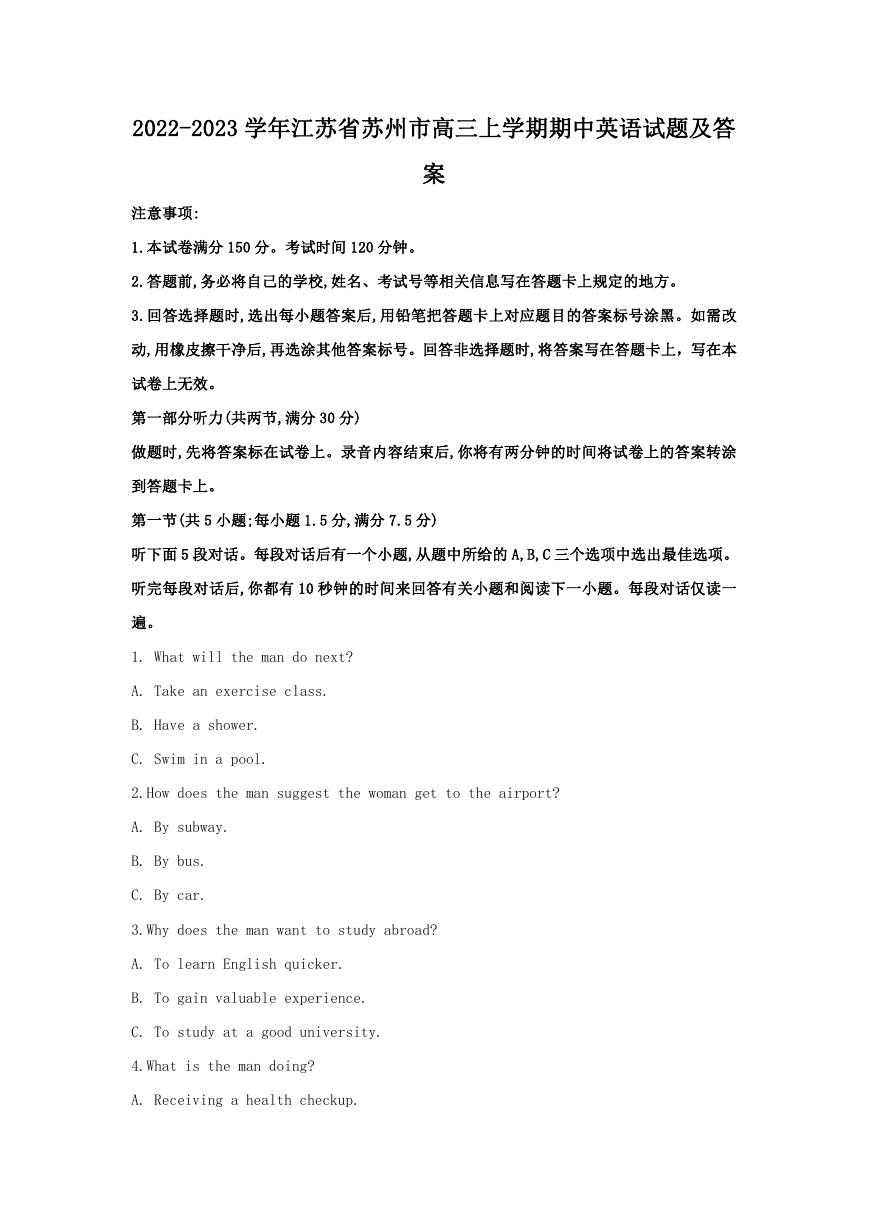
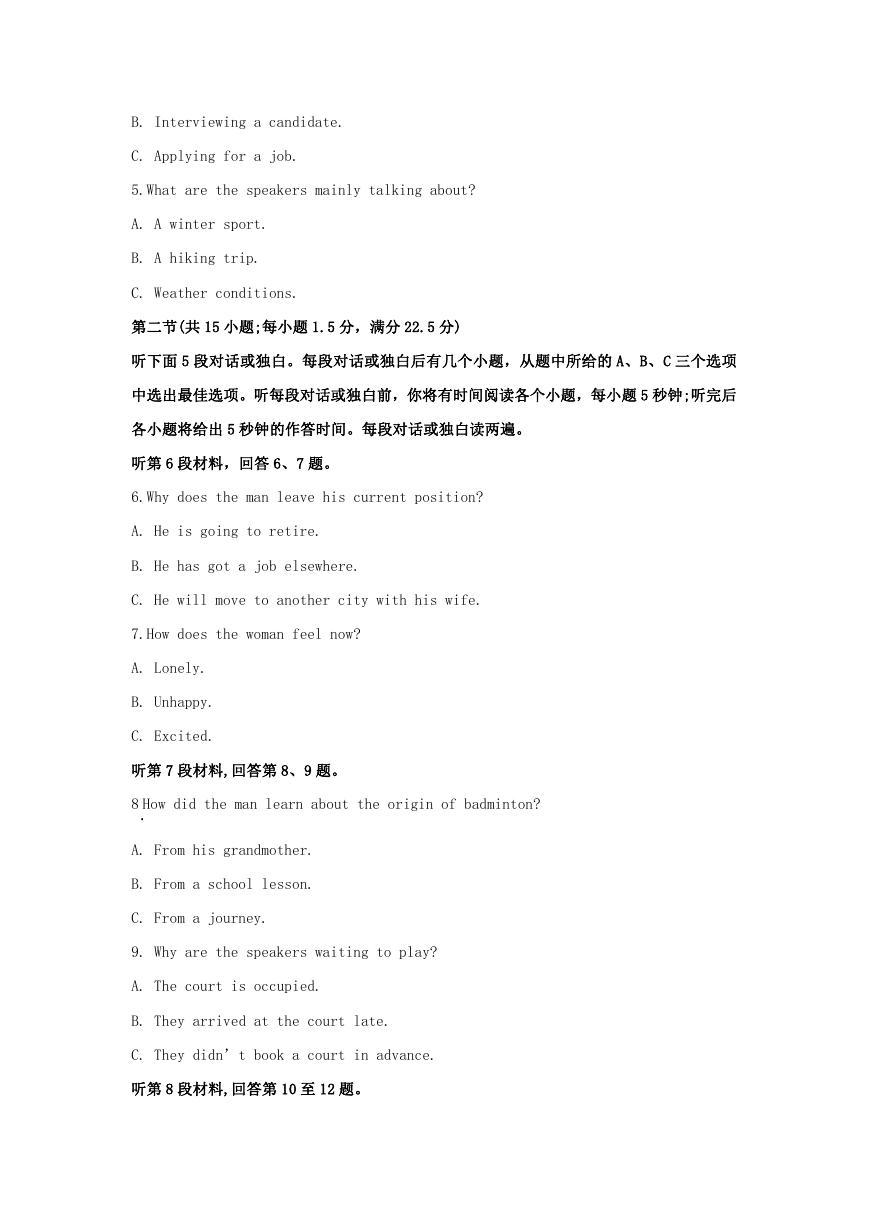

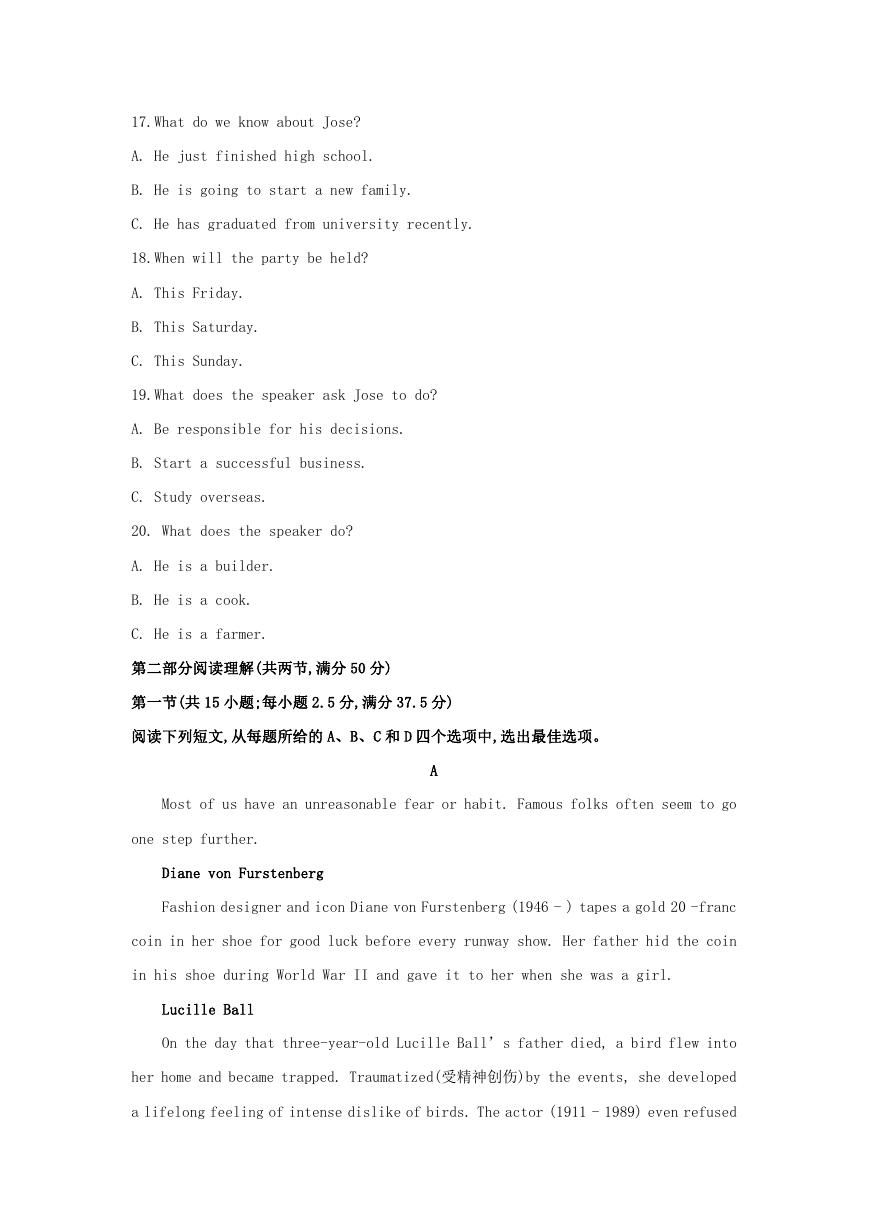
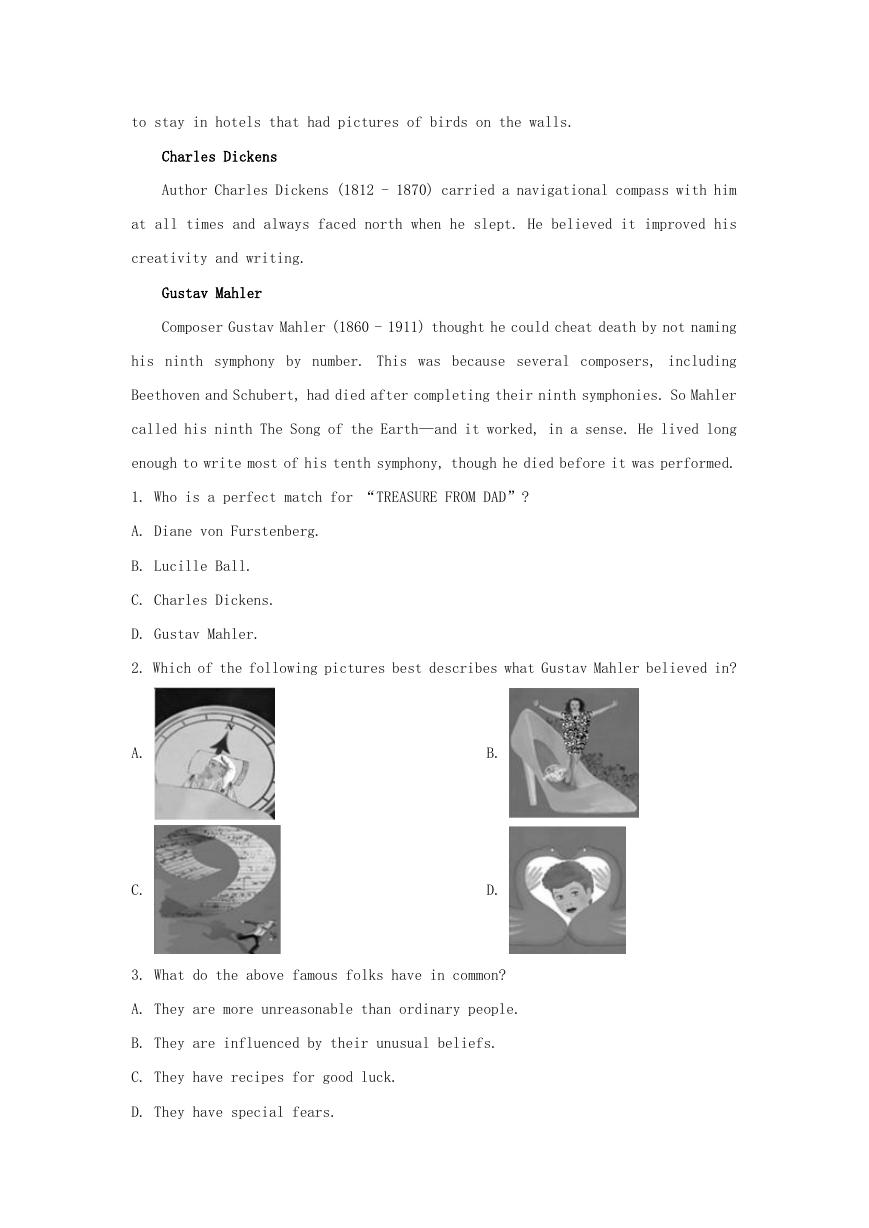


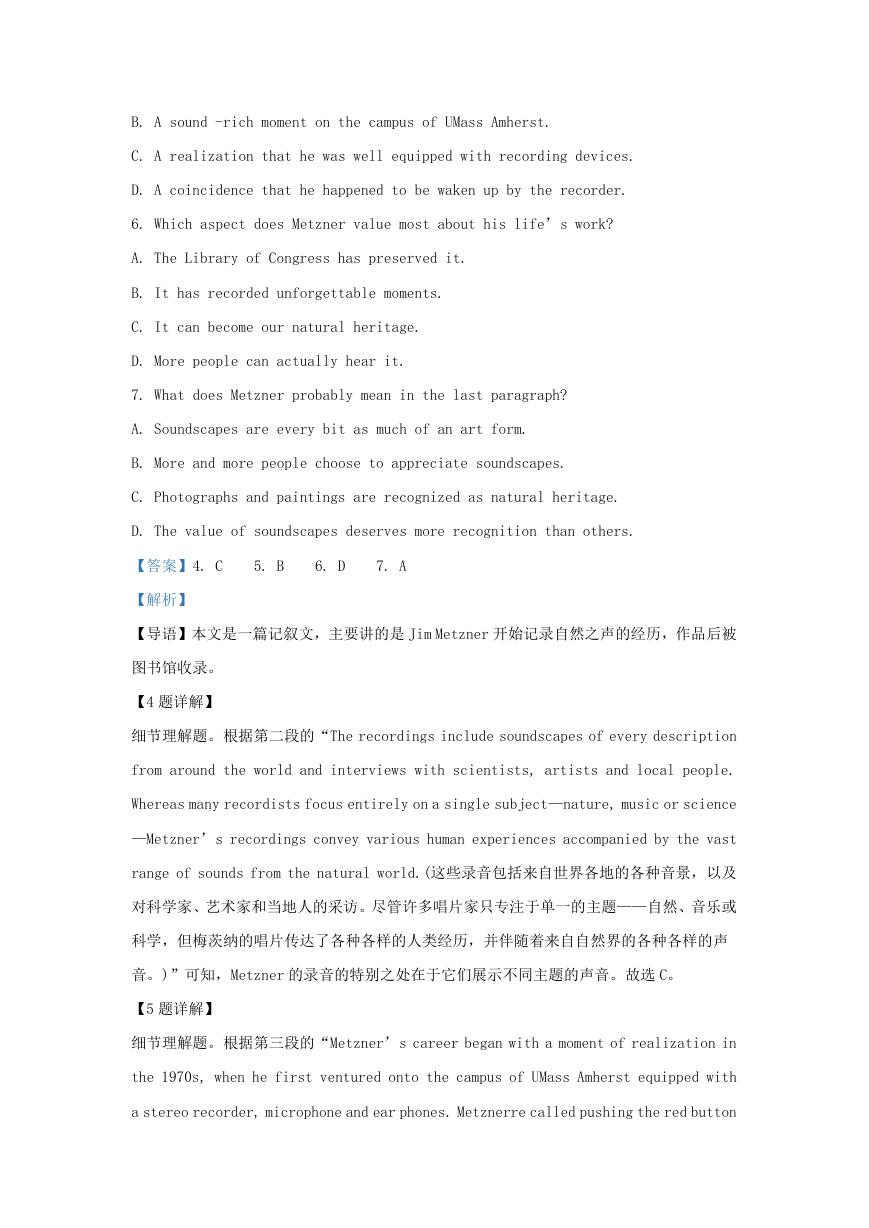








 2023年江西萍乡中考道德与法治真题及答案.doc
2023年江西萍乡中考道德与法治真题及答案.doc 2012年重庆南川中考生物真题及答案.doc
2012年重庆南川中考生物真题及答案.doc 2013年江西师范大学地理学综合及文艺理论基础考研真题.doc
2013年江西师范大学地理学综合及文艺理论基础考研真题.doc 2020年四川甘孜小升初语文真题及答案I卷.doc
2020年四川甘孜小升初语文真题及答案I卷.doc 2020年注册岩土工程师专业基础考试真题及答案.doc
2020年注册岩土工程师专业基础考试真题及答案.doc 2023-2024学年福建省厦门市九年级上学期数学月考试题及答案.doc
2023-2024学年福建省厦门市九年级上学期数学月考试题及答案.doc 2021-2022学年辽宁省沈阳市大东区九年级上学期语文期末试题及答案.doc
2021-2022学年辽宁省沈阳市大东区九年级上学期语文期末试题及答案.doc 2022-2023学年北京东城区初三第一学期物理期末试卷及答案.doc
2022-2023学年北京东城区初三第一学期物理期末试卷及答案.doc 2018上半年江西教师资格初中地理学科知识与教学能力真题及答案.doc
2018上半年江西教师资格初中地理学科知识与教学能力真题及答案.doc 2012年河北国家公务员申论考试真题及答案-省级.doc
2012年河北国家公务员申论考试真题及答案-省级.doc 2020-2021学年江苏省扬州市江都区邵樊片九年级上学期数学第一次质量检测试题及答案.doc
2020-2021学年江苏省扬州市江都区邵樊片九年级上学期数学第一次质量检测试题及答案.doc 2022下半年黑龙江教师资格证中学综合素质真题及答案.doc
2022下半年黑龙江教师资格证中学综合素质真题及答案.doc